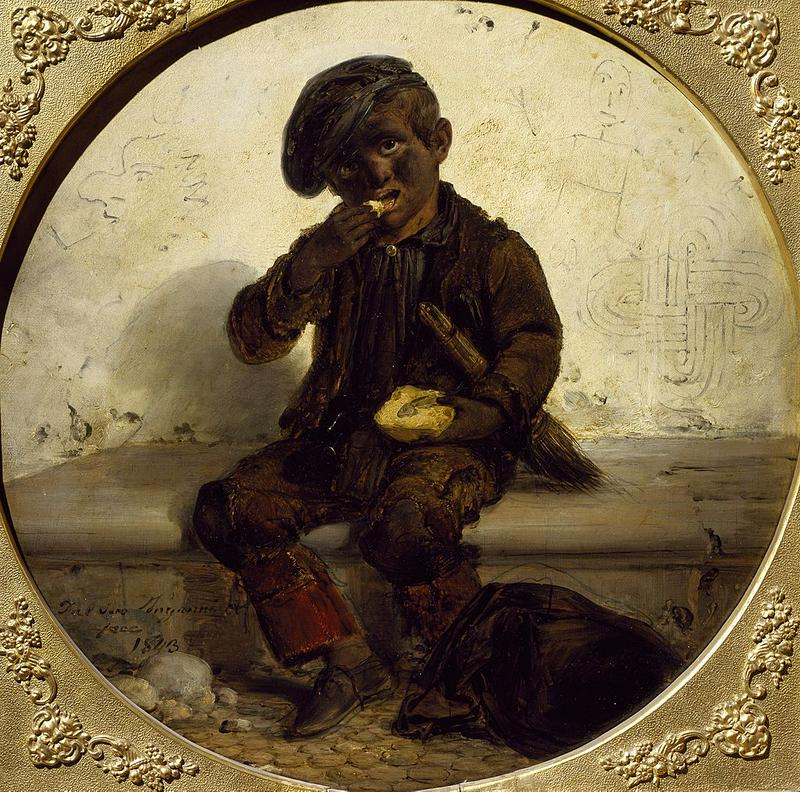Chimney Sweepers Act of 1788: Child Labor Law That Allowed Eight-Year-Olds To Work Legally
By | January 3, 2021

Mary Poppins might romanticize the role of chimney sweeping in Edwardian London, but in reality, there was nothing romantic about it. The profession employed not jaunty young men but enslaved children and forced them to work long hours in dangerous conditions. After the death of a young boy, England passed the Chimney Sweepers Act of 1788, setting the legal minimum age for chimney sweeping at a whopping eight years old, but it took much longer to enact real change.
A Job For Children
For centuries, Londoners heated their homes with coal, a notoriously dirty source of energy that leaves behind creosote build-up and turned every chimney into a potential fire hazard. After a particularly devastating chimney fire that spread out of control throughout London and destroyed more than 70,000 homes in September 1666, the city got serious about chimney regulation, requiring them to be built narrower and cleaned frequently.
These new requirements seemed maddeningly contradictory, however: How was anyone supposed to get inside these new, narrow chimneys to clean them? Only children could fit, but this was a time when that wasn't as much of a problem as you'd hope, so master sweepers simply approached families living in poverty and offered to take a hungry mouth or two off their hands. They typically selected young boys around six years of age and gave the parents a stack of coins in exchange for the child.

A Deadly Job
As you can imagine, the life of a child chimney sweep was no trip to Disneyland. The master sweeper made sure the child was fed, but it was meager portions, and provided him a place to sleep, but it was typically a damp basements with nothing but sooty, carcinogenic cloth bags to use as bedding. To toughen the child's knees and elbows, as was required of a chimney sweep, the master sweeper took a stiff wire brush to their skin. In time, thick calluses formed, but in the interim, the youngster had to endure raw, open wounds and the possibility of infection.
As uncomfortable as life was outside the chimney, life inside was downright deadly. It wasn't uncommon for a child to get stuck, after which another young boy was sent down to rescue him, often only for them both to become trapped. In the best-case scenario, walls had to be torn down to free the children. All too often, nothing was freed but corpses.
It wasn't until 1875, however, when 12-year-old George Brewster died in just such a manner, that the public became outraged enough to do something about it. Brewster's master, William Wyer, was found guilty of manslaughter for ordering the boy into the chimney shaft, but he wasn't doing anything master sweepers across the city weren't doing, so the public pushed further for legislation to address the issue of child chimney sweeps.

The Chimney Sweepers Act Of 1788
Within a few years, British Parliament passed the Chimney Sweepers Act of 1788, which prohibited boys under the age of eight and any child who didn't have parental consent to serve as "apprentices" for master sweepers. It also regulated the conditions under which the child must work and live and, strangely, mandated his attendance at church every Sunday.
As much as young chimney sweeps probably appreciated a few more years of childhood and Sunday mornings off, they continued to endure awful health effects. Respiratory diseases and eye infections that sometimes led to blindness were common, and numerous kids were disfigured or their growth stunted from spending so much time in odd positions in the narrow chimneys before their bones were fully formed. A certain type of scrotal cancer developed in adolescence by boys who worked as chimney sweeps in childhood was so common that it was known as "chimney sweep cancer" and became the first recognized industrial cancer. Most former chimney sweeps, if they were lucky enough to reach "former" status at all, didn't reach middle age.
In the 1830s, British Parliament began to address the issue of child labor and exploitation in factories, and at some point, somebody apparently remembered that children were still being dunked in cancer tubes. The Chimney Sweep Act of 1834 raised the minimum age of chimney sweep apprentices to 10 years old but prohibited any under 14 from actually entering a chimney and was revised in 1840 to raise the age to 16, but these measures still seem woefully inadequate. Charles Kingsley thought so, too, and his 1863 novel The Water-Babies once again ruffled public feathers and forced Parliament to pass the Chimney Sweepers Regulation Act, which required all chimney sweeps to be licensed and empowered the police to fine master sweepers who used underage sweeps.

